Turn on suggestions
Auto-suggest helps you quickly narrow down your search results by suggesting possible matches as you type.
Showing results for
The cost of console gaming
The cost of console gaming
Topic Options
- Subscribe to RSS Feed
- Mark as New
- Mark as Read
- Bookmark
- Subscribe
- Printer Friendly Page
- Report to Moderator
- Plusnet Community
- :
- Plusnet Blogs
- :
- The cost of console gaming
The cost of console gaming
30-09-2014
7:00 PM
 Gaming seems a costly luxury in our current climate, but is it as expensive as it seems? Plusnet found out that you’re not coughing up as much as you may think… The Office of National Statistics published figures earlier this year showing that the average salary is £26,500. Back in 1995, when the first Playstation was released in Europe, this was just £17,470 – meaning it has risen by almost £10,000 over the last 19 years.
Gaming seems a costly luxury in our current climate, but is it as expensive as it seems? Plusnet found out that you’re not coughing up as much as you may think… The Office of National Statistics published figures earlier this year showing that the average salary is £26,500. Back in 1995, when the first Playstation was released in Europe, this was just £17,470 – meaning it has risen by almost £10,000 over the last 19 years.
This is fine, though we have to consider inflation as well. Minimum wage has risen year on year too. Inflation is essentially a measure in prices and goods and services. We can use it to measure how different the cost or value of something would be today compared to what it was in the past. 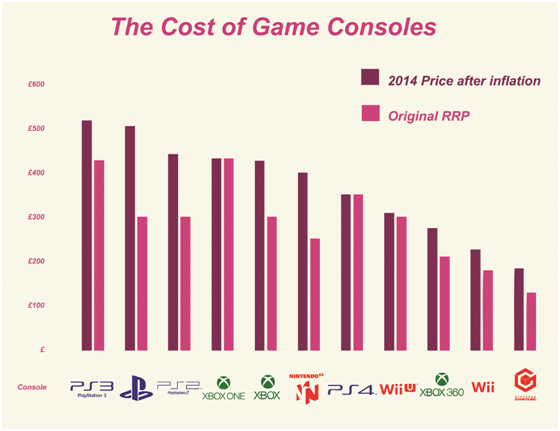 Our graph above shows a comparison of the cost of popular consoles when they were released, versus how much this would be in the year 2014 after inflation. Sony top the charts with the most expensive consoles whilst Nintendo sit at the bottom.
Our graph above shows a comparison of the cost of popular consoles when they were released, versus how much this would be in the year 2014 after inflation. Sony top the charts with the most expensive consoles whilst Nintendo sit at the bottom.
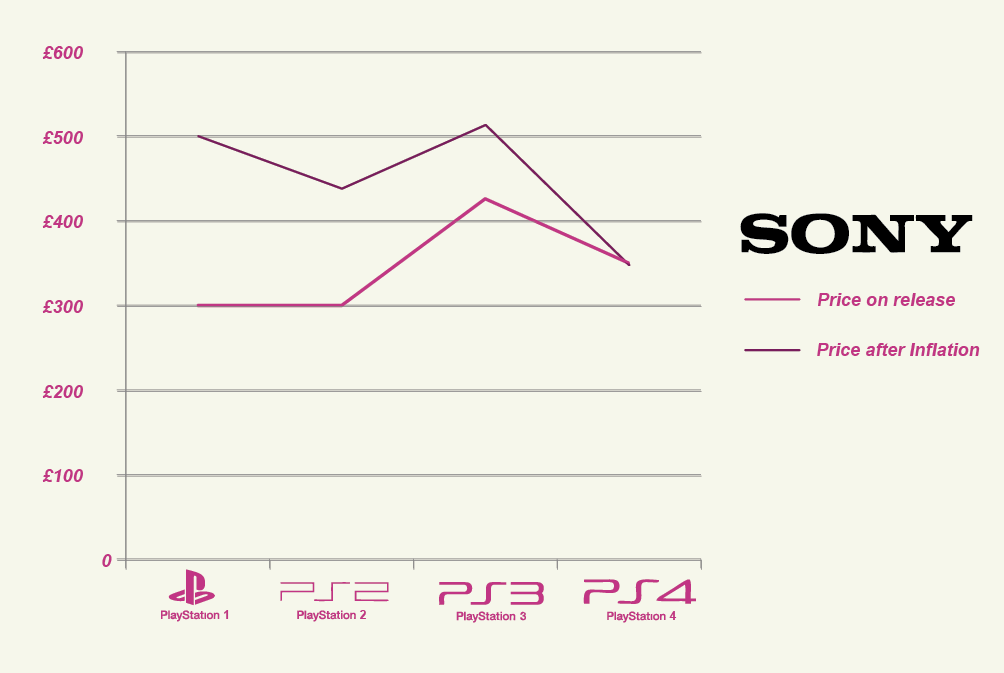 Sony’s latest console, the Playstation 4, was released at price of £349.99. This is 16% more than it was for the first Playstation almost 20 years ago, however, an original PlayStation would now retail at £519.09 after inflation. That means that Sony has managed to undercut its first console by around £170.00 – a lot, considering that’s nearly half the price of the most recent console. Though they are the most expensive, they will take some comfort knowing that they do have a loyal fan base. This allows them to generate more income from sales when looking at price and sales. Moreover, they have a further boost with the fact that PS4 sales are now well ahead of Xbox One.
Sony’s latest console, the Playstation 4, was released at price of £349.99. This is 16% more than it was for the first Playstation almost 20 years ago, however, an original PlayStation would now retail at £519.09 after inflation. That means that Sony has managed to undercut its first console by around £170.00 – a lot, considering that’s nearly half the price of the most recent console. Though they are the most expensive, they will take some comfort knowing that they do have a loyal fan base. This allows them to generate more income from sales when looking at price and sales. Moreover, they have a further boost with the fact that PS4 sales are now well ahead of Xbox One.
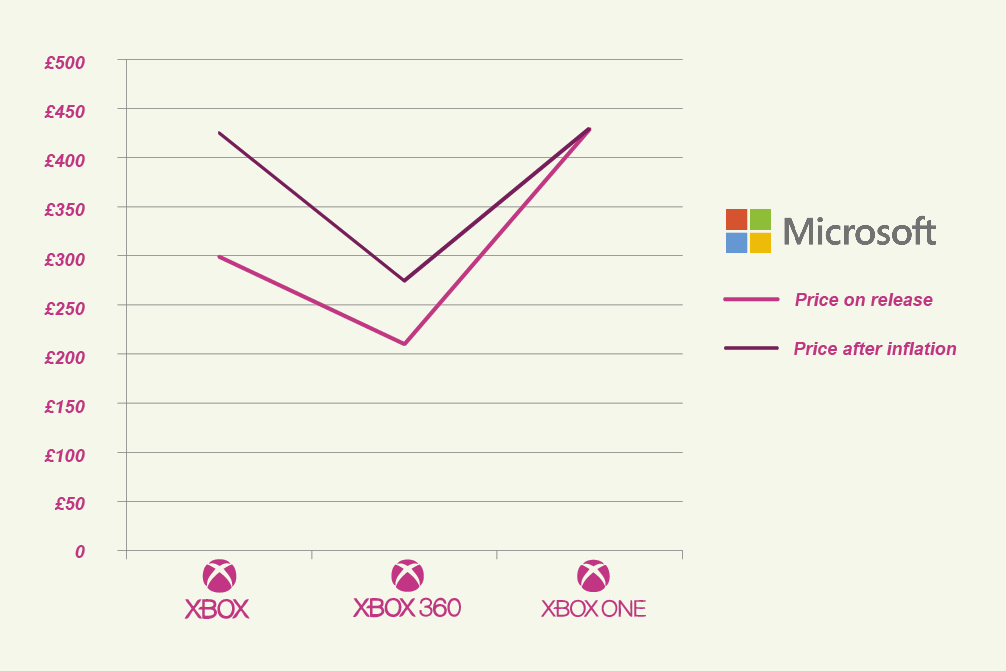 This ongoing battle between the two saw Microsoft flourish when sales for the PS3 – the most expensive console released – were outstripped by the £215.00 cheaper Xbox 360. Nevertheless, they reacted swiftly to try and claw back some of the ground lost by offering a cheaper version of the Xbox One with a price tag of £349.99. Only time will tell whether this will make a difference in sales.
This ongoing battle between the two saw Microsoft flourish when sales for the PS3 – the most expensive console released – were outstripped by the £215.00 cheaper Xbox 360. Nevertheless, they reacted swiftly to try and claw back some of the ground lost by offering a cheaper version of the Xbox One with a price tag of £349.99. Only time will tell whether this will make a difference in sales.
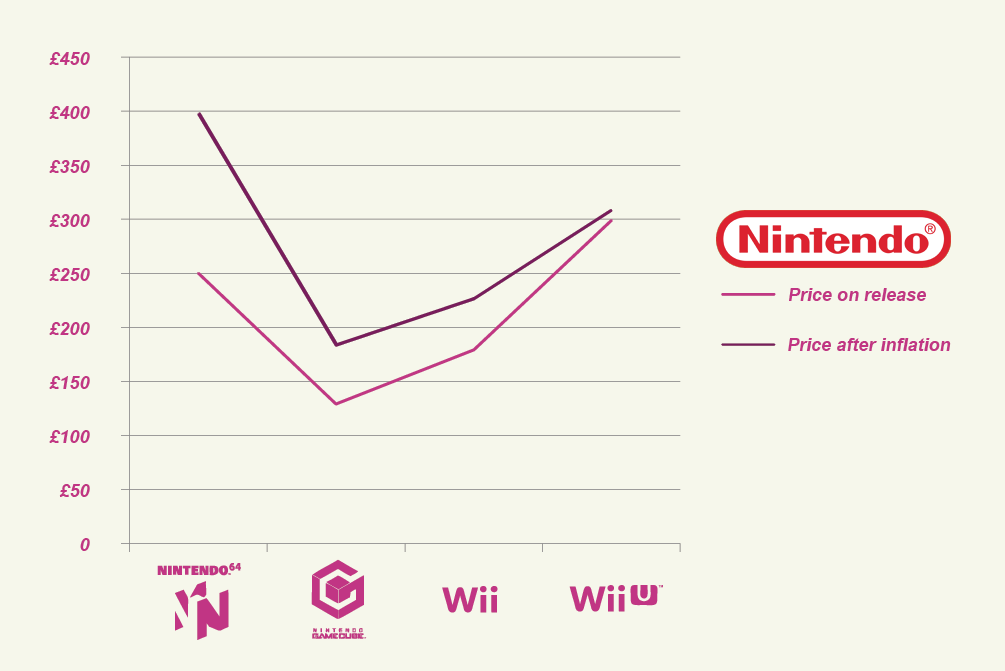 If we were to include SEGA on our table of consoles above, the SEGA Saturn (with inflation) would be the most expensive console ever, retailing today at £694.
If we were to include SEGA on our table of consoles above, the SEGA Saturn (with inflation) would be the most expensive console ever, retailing today at £694.
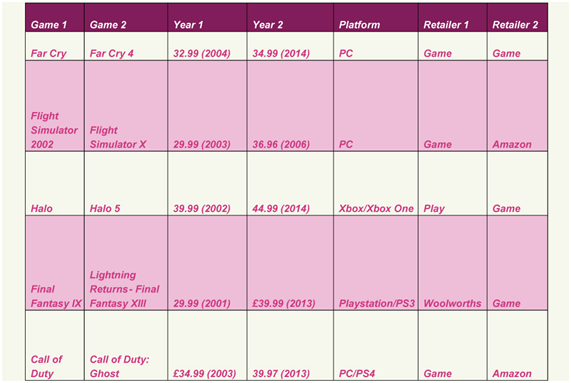 Back in 2001 when Final Fantasy IX was released for Playstation, the cost of the game was £29.99. The PS3 version of Lightning Returns: Final Fantasy XIII twelve years on retailed at £39.99 - a whole £10 more. Just as was the case with console pricing, however, with inflation the 2001 game would now be £44. Far Cry was released on PC at £32.99 in 2004 and yet a decade on, Far Cry 4 – released later this year – is being sold pre-ordered at £34.99 for the PC – far cheaper than what the old version would now be priced at with inflation.
Back in 2001 when Final Fantasy IX was released for Playstation, the cost of the game was £29.99. The PS3 version of Lightning Returns: Final Fantasy XIII twelve years on retailed at £39.99 - a whole £10 more. Just as was the case with console pricing, however, with inflation the 2001 game would now be £44. Far Cry was released on PC at £32.99 in 2004 and yet a decade on, Far Cry 4 – released later this year – is being sold pre-ordered at £34.99 for the PC – far cheaper than what the old version would now be priced at with inflation.
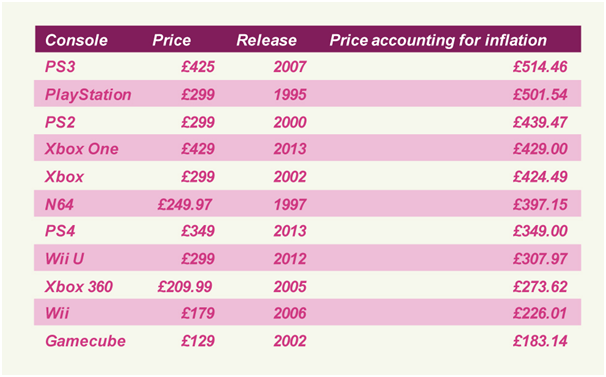
 Our graph above shows a comparison of the cost of popular consoles when they were released, versus how much this would be in the year 2014 after inflation. Sony top the charts with the most expensive consoles whilst Nintendo sit at the bottom.
Our graph above shows a comparison of the cost of popular consoles when they were released, versus how much this would be in the year 2014 after inflation. Sony top the charts with the most expensive consoles whilst Nintendo sit at the bottom.
Playstation
 Sony’s latest console, the Playstation 4, was released at price of £349.99. This is 16% more than it was for the first Playstation almost 20 years ago, however, an original PlayStation would now retail at £519.09 after inflation. That means that Sony has managed to undercut its first console by around £170.00 – a lot, considering that’s nearly half the price of the most recent console. Though they are the most expensive, they will take some comfort knowing that they do have a loyal fan base. This allows them to generate more income from sales when looking at price and sales. Moreover, they have a further boost with the fact that PS4 sales are now well ahead of Xbox One.
Sony’s latest console, the Playstation 4, was released at price of £349.99. This is 16% more than it was for the first Playstation almost 20 years ago, however, an original PlayStation would now retail at £519.09 after inflation. That means that Sony has managed to undercut its first console by around £170.00 – a lot, considering that’s nearly half the price of the most recent console. Though they are the most expensive, they will take some comfort knowing that they do have a loyal fan base. This allows them to generate more income from sales when looking at price and sales. Moreover, they have a further boost with the fact that PS4 sales are now well ahead of Xbox One.
Xbox
By comparison, Microsoft’s Xbox has actually got more expensive over time. The first Xbox was released at a cost of £299 in 2002. This has since increased to £429.99 for the Xbox One, a price increase of around 43%. Even accounting for inflation, the Xbox One is more expensive than the original Xbox by around £5. The Xbox 360 is the cheapest of the Microsoft family and the cheapest console in the Sony v Microsoft battle. This ongoing battle between the two saw Microsoft flourish when sales for the PS3 – the most expensive console released – were outstripped by the £215.00 cheaper Xbox 360. Nevertheless, they reacted swiftly to try and claw back some of the ground lost by offering a cheaper version of the Xbox One with a price tag of £349.99. Only time will tell whether this will make a difference in sales.
This ongoing battle between the two saw Microsoft flourish when sales for the PS3 – the most expensive console released – were outstripped by the £215.00 cheaper Xbox 360. Nevertheless, they reacted swiftly to try and claw back some of the ground lost by offering a cheaper version of the Xbox One with a price tag of £349.99. Only time will tell whether this will make a difference in sales.
Best of the rest
Nintendo remains the cheapest manufacturer. The GameCube retailed at £129.99 when it first came out in 2002 whilst the Wii U is their most expensive console at £299, released in 2012. The cheap price tag of the Wii was a major factor in its success and helped sell over 100 million units. Despite this, they have always found more success with the handheld market, selling 118 million Gameboys and 153 million Nintendo DS consoles. If we were to include SEGA on our table of consoles above, the SEGA Saturn (with inflation) would be the most expensive console ever, retailing today at £694.
If we were to include SEGA on our table of consoles above, the SEGA Saturn (with inflation) would be the most expensive console ever, retailing today at £694.
Game costs
We also looked at how much games cost to buy from various retailers, to see if there was a correlation between game and console. Back in 2001 when Final Fantasy IX was released for Playstation, the cost of the game was £29.99. The PS3 version of Lightning Returns: Final Fantasy XIII twelve years on retailed at £39.99 - a whole £10 more. Just as was the case with console pricing, however, with inflation the 2001 game would now be £44. Far Cry was released on PC at £32.99 in 2004 and yet a decade on, Far Cry 4 – released later this year – is being sold pre-ordered at £34.99 for the PC – far cheaper than what the old version would now be priced at with inflation.
Back in 2001 when Final Fantasy IX was released for Playstation, the cost of the game was £29.99. The PS3 version of Lightning Returns: Final Fantasy XIII twelve years on retailed at £39.99 - a whole £10 more. Just as was the case with console pricing, however, with inflation the 2001 game would now be £44. Far Cry was released on PC at £32.99 in 2004 and yet a decade on, Far Cry 4 – released later this year – is being sold pre-ordered at £34.99 for the PC – far cheaper than what the old version would now be priced at with inflation.
Apps and mobile
Another element to consider is whether consoles may be displaced by apps and mobile gaming on phones and tablets. The Entertainment Software Association estimates that the mobile games market will be worth $14.74 billion by 2017, showing how popular and prosperous the market is becoming. On PCs, platforms like Steam offer downloadable games at cheaper prices, which brought a new lease of life to the industry. Coupled with faster broadband speeds, better graphics and speedier computers, could PC gaming be the new benchmark for gaming? As technology betters, companies are able to keep offering us a better price. The figures above show a market with consoles remaining at a competitive price. Though we all feel a little pinched right now, the evidence shows that gaming has never been cheaper. What do you think? Do you get your money’s worth when it comes to gaming?Full data

